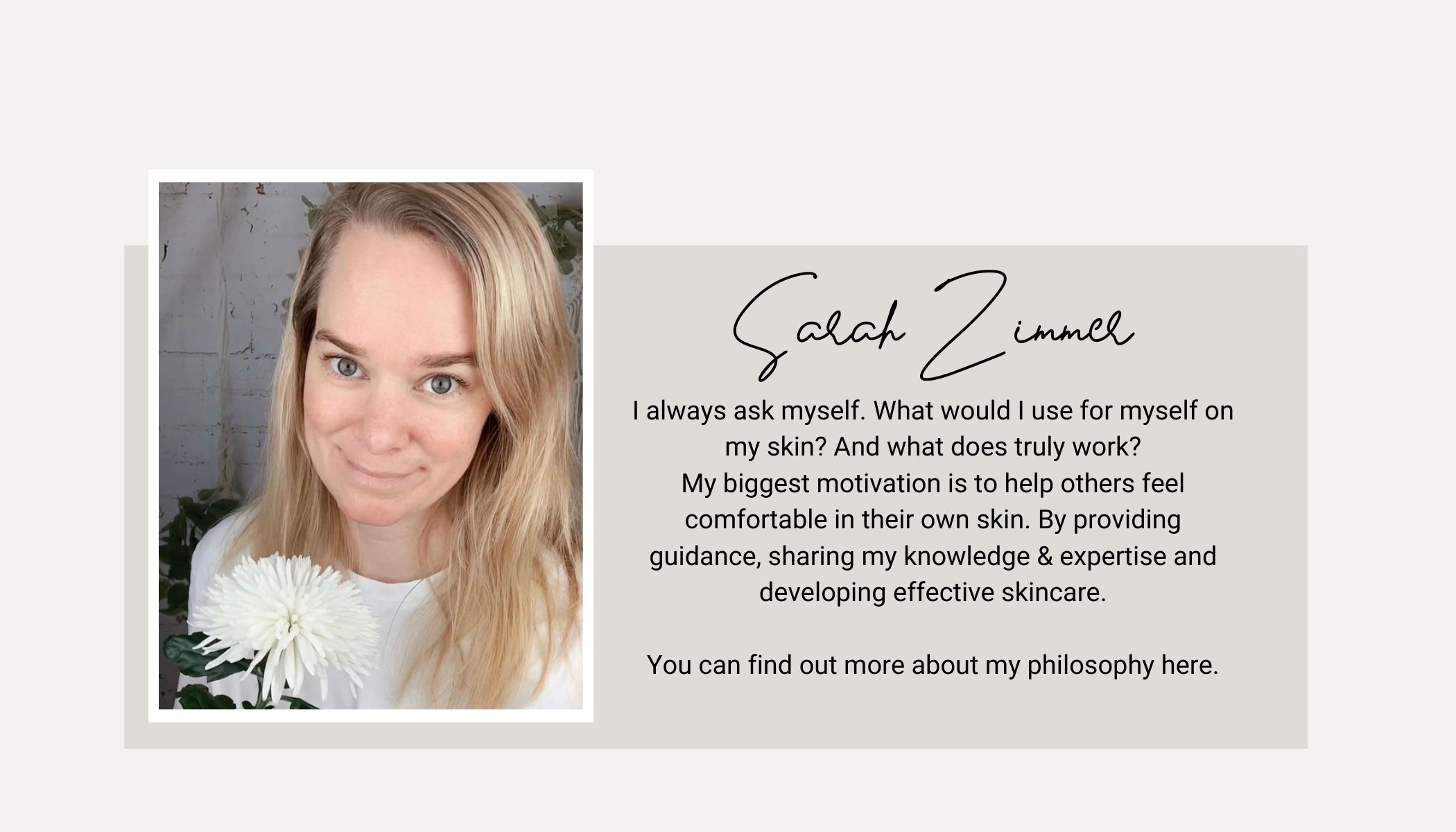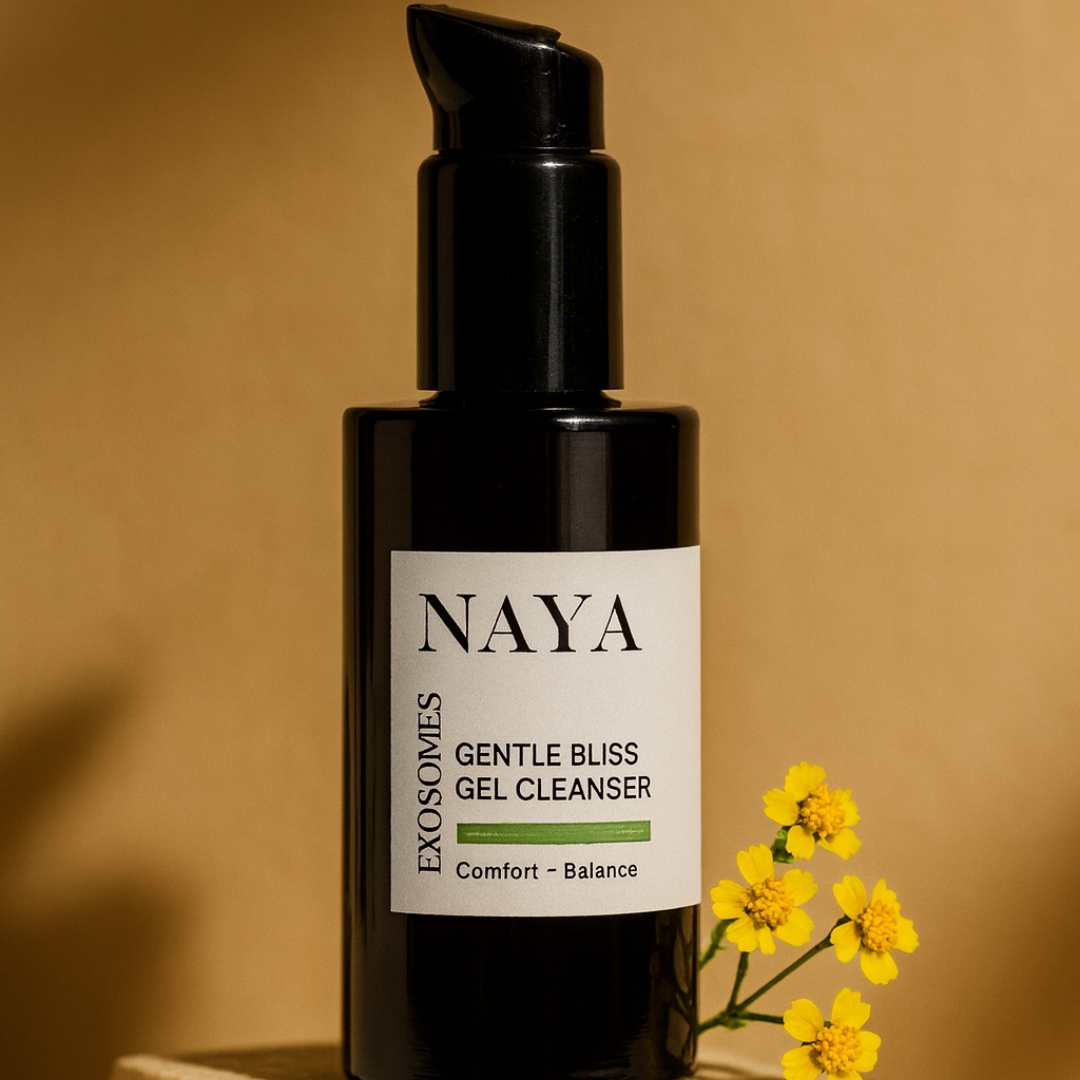Mineral vs. Chemical Sunscreen: What’s Really Better for Your Skin?
Is Mineral Sunscreen Really Better? The Truth Behind the Trend
Discover the real differences between mineral and chemical sunscreen. Learn why ‘mineral-only’ isn’t always better, and how to choose the right SPF for your skin health.
Is Mineral Sunscreen Really Better? The Truth Behind the Trend
In the world of clean beauty, mineral sunscreen is often painted as the hero: natural, gentle, and safe. But is it really better than chemical sunscreen? Or is this just clever marketing?
As a skin health expert, trained nutritional therapist, and founder of NAYA, I've spent years studying both the science of SPF and the sensory experience of skincare. I’ve formulated dozens of test versions—from full mineral blends to modern hybrids—searching for one simple truth: what will people actually use consistently, and what will their skin truly tolerate?
Because when it comes to sunscreen, it's not about trends – it's about protection, tolerance, and consistency.
What Are Mineral and Chemical Sunscreens?
-
Mineral (Organic) Filters: These include zinc oxide and titanium dioxide. They sit on the skin and reflect UV rays. Please do not call them physical filters as they don't physcially sit on the skin like a shield and fight off sun-rays. They work the same way as inorganic filters by converting sun ways into heat within the skin.
-
Chemical (inorganic) Filters:
Ingredients like Tinosorb S, Uvinul A Plus, and Mexoryl SX absorb UV rays and transform them into heat. These are modern, highly photostable filters used extensively in Europe.
Both types can be broad-spectrum, effective, and safe – if formulated well.
Understanding Broad-Spectrum Protection
Let’s clear up a common misconception: SPF is not the whole story.
-
UVB Rays are responsible for sunburn and are what SPF numbers refer to.
-
UVA Rays are deeper-penetrating and contribute to skin aging, DNA damage, and pigmentation. UVA can pass through glass and clouds.
Here’s the issue: not all mineral sunscreens protect well against UVA. Zinc oxide offers some coverage, but titanium dioxide barely protects in the UVA-1 range.
Modern organic filters provide superior broad-spectrum coverage — especially for UVA.
So, when we talk about “better” — the filter alone doesn’t tell the whole story. Coverage spectrum matters.
Common Myths About Mineral Sunscreen
Myth 1: Mineral sunscreen is safer for your skin.
Not necessarily. Zinc oxide and titanium dioxide can irritate sensitive or acne-prone skin. They’re drying for some and may trigger breakouts or tightness. They also cummulate over time into the skin barrier, potentially disrupting the skin barrier in the long-run.
Myth 2: Chemical filters are toxic.
This myth is persistent but oversimplified. Modern chemical filters undergo extensive safety testing in the EU. Tinosorb S, for example, has over 20 years of data and excellent tolerability.
Myth 3: Mineral sunscreens are better for the environment.
The term “reef-safe” is not regulated. In fact, mineral filters in nano form can accumulate in aquatic life. What’s more important is responsible use, rinse-off practices, and non-bioaccumulating filters.
Myth 4: Mineral sunscreen is natural.
Dear reader, if you’re using mineral sunscreen, the active ingredient was 100% synthesised in a lab. No, it wasn’t scooped from a mountain and spooned into your tube. It’s a highly refined, energy-intensive process to turn raw zinc or titanium from the earth into the micronised, coated particles used in sunscreen today. And sometimes they are even coated in microplastic. Fantastic! Mineral filters may sound more “natural,” but their production is anything but. What matters more is how the end product performs — not the label it hides behind.
Personal Experience: Why I Didn't Choose Mineral-Only
When formulating our sunscreen at NAYA, I tested 12+ variations.
I started with full mineral formulas—because that’s what the clean beauty world wanted. But they felt dry, left a cast (even on my light-medium skin), and didn’t layer well. I even got really bad pigmentation and a few dark spots. Worst of all? My testers hated the experience. They wore it once and never reapplied.
I realised: the most elegant sunscreen is the one you actually want to use. (And yes, I was the first one saying it and my competitors - particularly in the German market - love copying my words) :)
So I built a formula that’s invisible, hydrating, fragrance-free, and supported with antioxidants—without the occlusive feel or ghostly cast. It's not Halloween every day.
The White Cast Problem
Mineral sunscreens often leave a visible residue. That’s because the particles reflect light. This might be fine for lighter skin tones, but for medium, olive, or darker complexions? It’s a dealbreaker.
Cosmetic elegance matters. If the texture or finish doesn’t feel good, people won’t reapply it—which leads to under-protection and damage.
At NAYA, we use skin-blurring, non-whitening filters designed to melt into every skin tone.
What Actually Makes a Good Sunscreen?
A high-quality SPF product should:
-
Offer broad-spectrum protection (UVA + UVB)
-
Be photostable (so it doesn't degrade under sun exposure)
-
Have proven safety data
-
Be tolerated well by sensitive skin
-
Feel elegant enough to wear daily
Bonus: it supports your skin barrier with antioxidant-rich ingredients, and is fragrance-free.
The Industry Narrative: Clean vs. Clinical
You may have seen social posts or brands claim “mineral sunscreen is the better, cleaner choice.” But as a founder, I believe our job isn’t to sell a narrative. It’s to formulate responsibly.
In Europe, we are fortunate to have high standards for SPF filters, allowing us to use best-in-class options. Demonising chemical filters doesn’t help the consumer. Instead, let’s focus on results, tolerance, and consistency.
Why Mineral Sunscreens Are Trending — Because of Big Brother U.S.
Let’s talk about why mineral sunscreen has become such a global trend — and no, it’s not because it’s actually “better.”
In the U.S., the FDA hasn’t approved a single new UV filter since the 1990s. That’s not due to extra safety diligence. It’s due to outdated legislation, excessive red tape, and (some might say) a sprinkle of industry politics.
So, Americans are left with zinc oxide, titanium dioxide, and a small handful of legacy chemical filters. No modern, photostable filters like Tinosorb S, Uvinul A Plus, or Mexoryl — all of which are widely used across Europe and Asia.
What happens when a market lacks innovation? It starts justifying its limitations. And so began the myth: “Mineral must be better.”
But here’s the truth: the U.S. also has some of the highest rates of skin cancer in the world — despite all that SPF. Why? Because most people don’t reapply, don’t like the texture, or are misled by fear-based narratives around “chemical” filters.
Unfortunately, this mindset gets exported. Europe, despite having superior technology, often inherits the marketing spin and fear culture of our “big brother.” It’s time to flip the script.
We’re not here to follow. We’re here to lead — with modern filters, microbiome-friendly textures, and protection that actually works.
Final Word: The Best Sunscreen is the One You Will Use
You can probably tell the frustration in my tone by now — and you're not wrong. That frustration comes from watching so much misinformation being pushed by brands trying to sell you a mediocre product dressed up in fear-based marketing.
Here's the truth: I don’t mind whether you use a mineral filter, a synthetic one, or something in between. What I care about is that you wear sunscreen. Every day. Because this isn’t just skincare — it’s preventative healthcare.
Sunscreen helps prevent premature aging, uneven pigmentation, inflammation, and even DNA damage that can lead to skin cancer. So whether you prefer a mineral formula, a hybrid, or a modern organic sunscreen — just make sure it feels good enough that you actually want to use it.
If you love mineral, great. Apply it. Reapply it. Wear it proudly. But let’s make decisions based on science — not spin.
Mineral-only isn’t always better. What matters most is finding a sunscreen that protects your skin without disrupting it — and that you actually enjoy wearing.
If that means a hybrid or modern organic formula, that’s not compromise. That’s intelligent skincare.
Explore our SPF range — formulated for sensitive skin, free from fragrance, and kind to your microbiome.
Shop our Everyday Sun Cream SPF 50+
Written by Sarah Zimmer, trained nutritional therapist & founder of NAYA Skincare.








Leave a comment